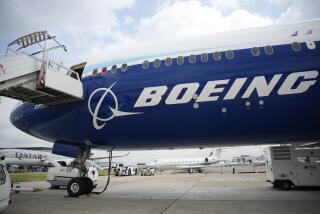Aviation Facing Long Recovery, Boeing Exec Says
- Share via
DUBAI — U.S. airplane maker Boeing Co. on Sunday predicted no revival in civil aircraft orders for two years, with those sales flowing into stronger deliveries in 2004.
The Sept. 11 terrorist attacks cost global aviation about one year’s growth, which translated into about 800 excess aircraft, Boeing’s executive vice president for sales, Seddik Belyamani, told Reuters.
“It is going to take all of 2002 to get back to the traffic level we were at,” said Belyamani, the company’s chief airliner sales executive. “It is going to take all of 2003 for the airlines to be profitable again.”
“[So] I expect airlines to start ordering airplanes by the end of 2003,” he said at the Dubai air show.
Stronger deliveries would follow in the following year.
Chicago-based Boeing has booked sales of about 270 planes so far this year, not including an intended order for 25 wide-body 777s that Dubai’s Emirates announced Sunday. Such intended orders, legally only memorandums of understanding, usually become definitive contracts after a few months.
The attacks have frightened many people away from flying. Airlines have responded by slashing schedules, grounding old planes and seeking to defer delivery of new ones from Boeing and its European rival Airbus.
The number of aircraft ordered depends on the number that airlines need to meet growth in traffic and to replace obsolete units in the global fleet of about 15,000.
Boeing and Airbus have responded to the crisis by slashing plans for 2002 deliveries.
But Belyamani still hoped to reach his long-standing 2001 sales target.
“My target is 400,” he said. “It is hard, but I am not giving up.”
No one really knows yet how badly the Sept. 11 attacks have damaged the airline industry and therefore the civil aerospace industry.
Belyamani said Boeing’s view has become less pessimistic in the eight weeks since the attacks.
“It is not as bad [now],” he said.
His opportunity to sell new planes will depend a lot on how many old grounded planes are scrapped.
Most speculation has focused on whether fuel-and labor-inefficient planes from the 1960s and 1970s would return to service.
“I think there is a very good chance that they will not,” Belyamani said.
Analysts tend to be less optimistic and regard most of the old planes as serviceable equipment that, even if grounded, will find its way back into service somewhere.
More to Read
Inside the business of entertainment
The Wide Shot brings you news, analysis and insights on everything from streaming wars to production — and what it all means for the future.
You may occasionally receive promotional content from the Los Angeles Times.









